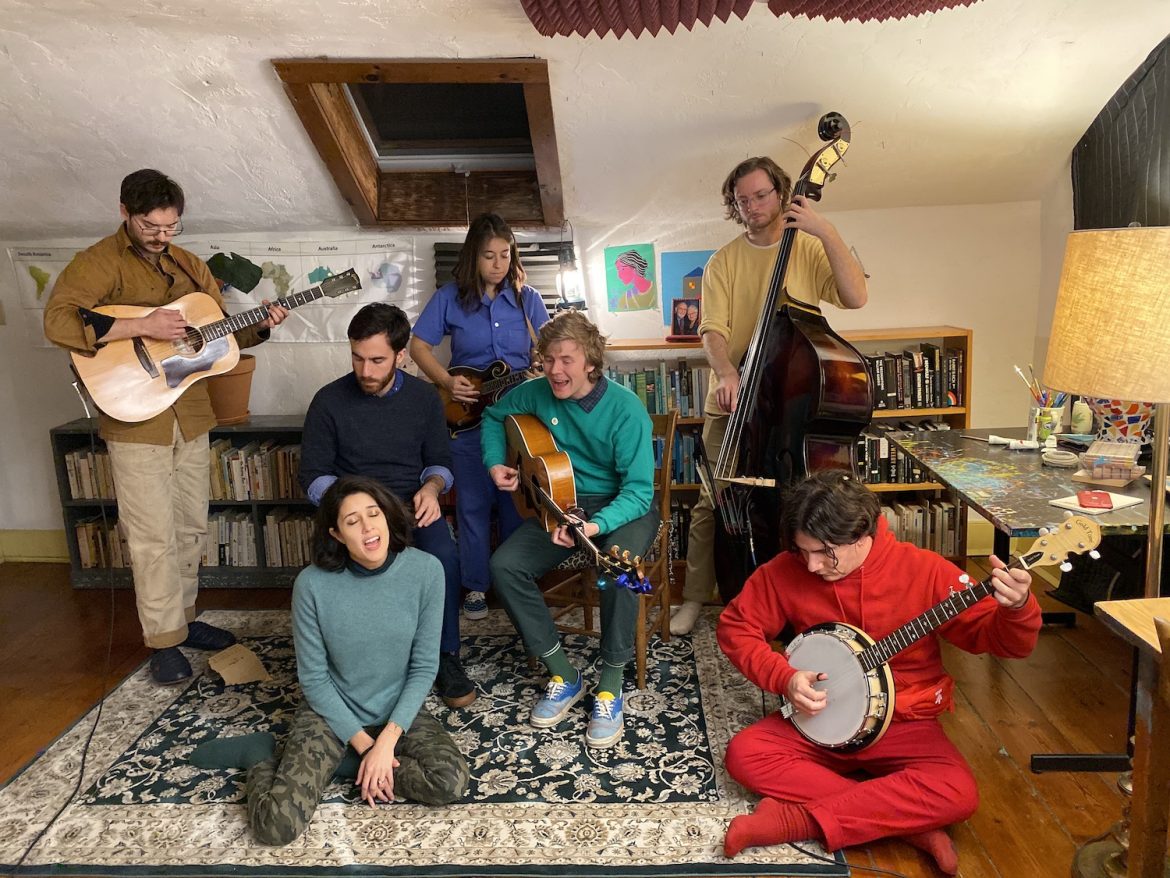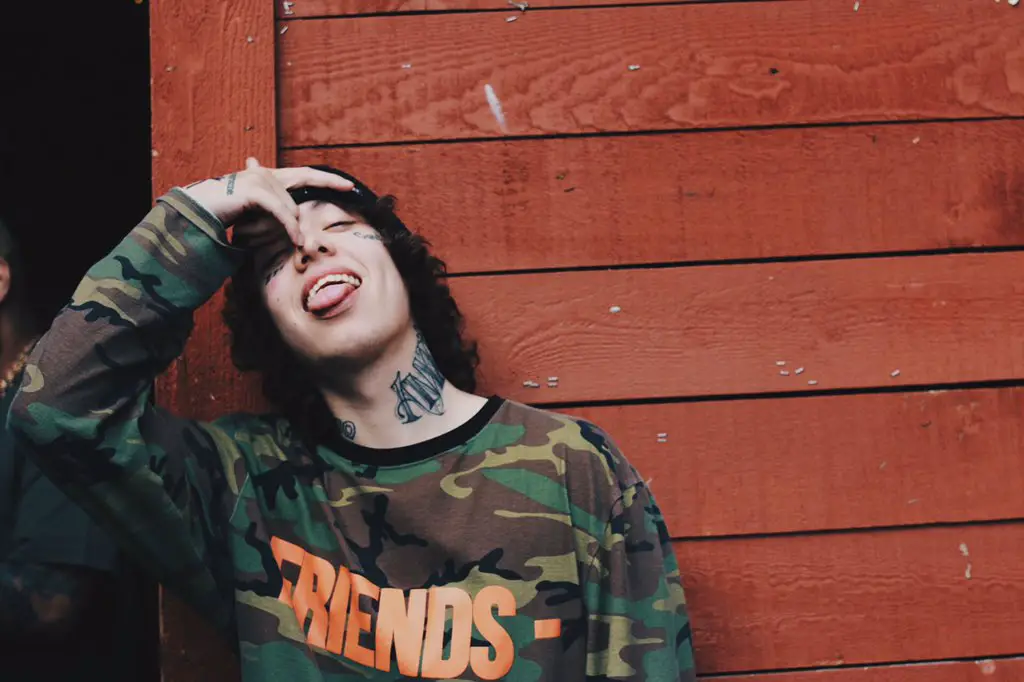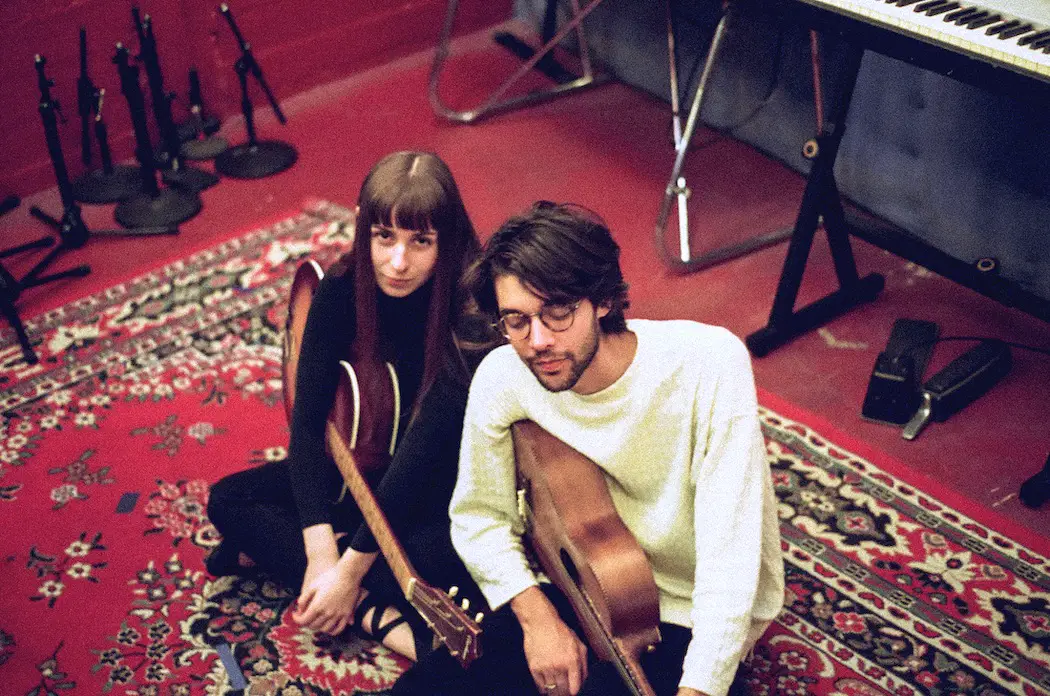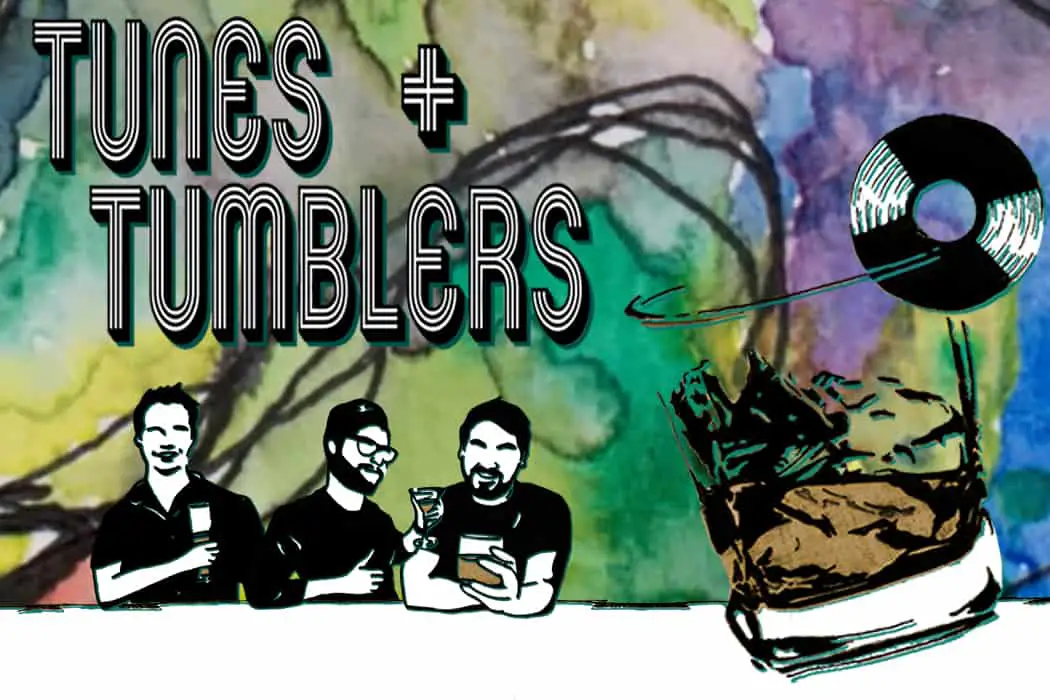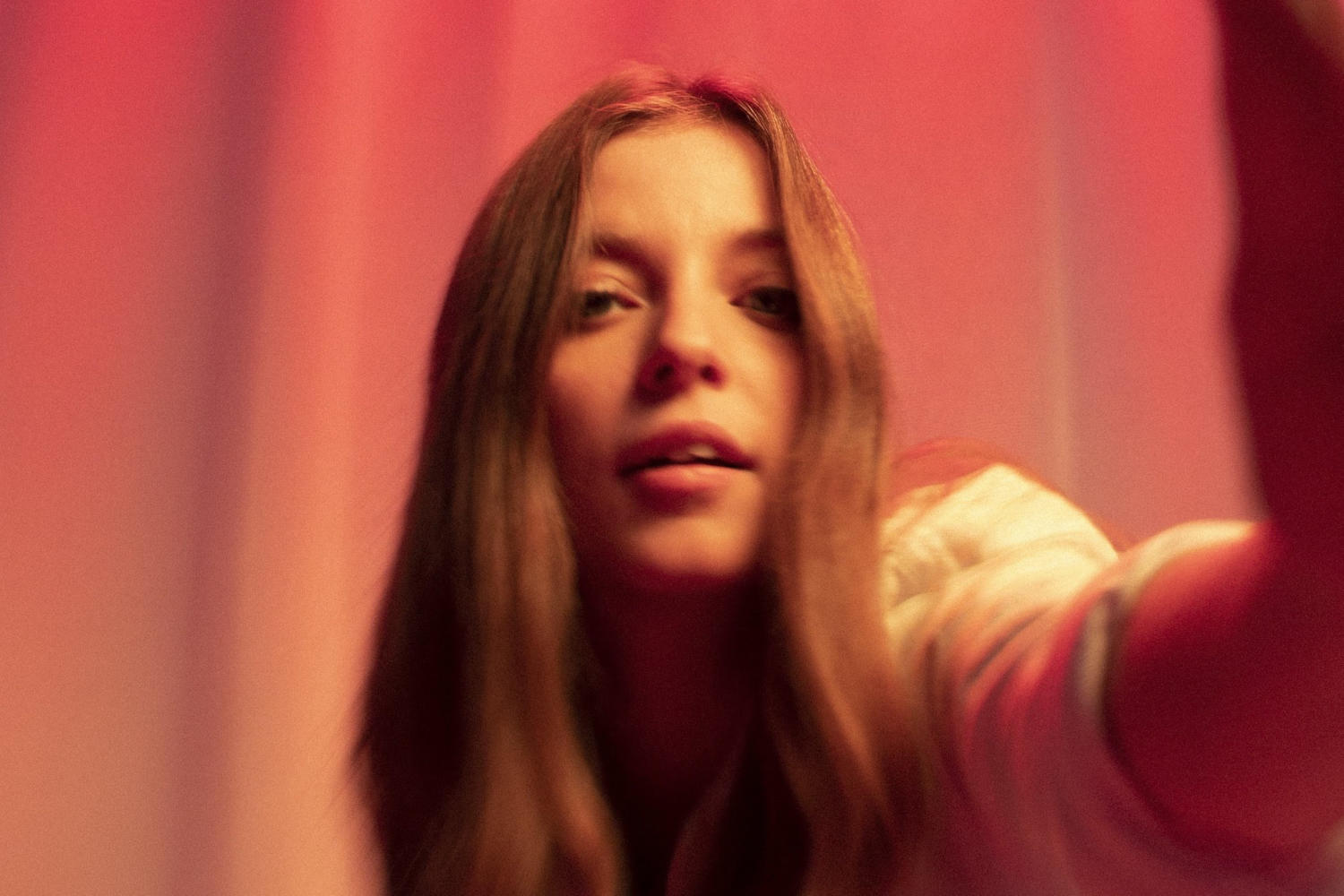Pinegrove frontman Evan Stephens Hall discusses the band’s new concert movie ‘Amperland, NY’, fan culture, and new music in 2021.
Stream: ‘Amperland’ – NY
I wrote a lot of these songs as a kind of a message in a bottle for other people out there that felt similarly — people who felt tenderly about the world but had also experienced its disappointments.
Evan Stephens Hall is a world builder.
Over the past decade, New Jersey alt-folk band Pinegrove has cultivated a community of fans, lovingly called Pinenuts, who not only listen but actively participate in the band’s music. When Pinegrove published the lyrics and guitar tabs to Marigold ahead of the album’s release, thousands of fans interpreted and recorded their own versions of the songs before hearing the band’s renditions.
Fascinated with semiotics, Hall puts a great deal of intention into the band’s album art and iconography, carefully crafting a lore that surrounds the indie-rock group. In cult-like fashion, countless fans, along with Hall himself, have permanently stamped the ampersand and the overlapping “cardinal” squares — symbols of inclusion and democracy — on their bodies.
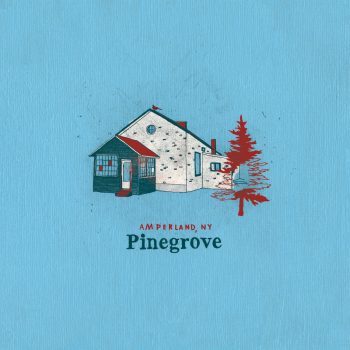
Out now, Amperland, NY is perhaps the band’s most adventurous endeavor in bringing the Pinegrovian universe to life. Through colorfully decorated sets and a charmingly goofy storyline about a pet stuffed sloth, Pinegrove delivers not only a gorgeous film but also the greatest, most comprehensive live album of their career.
Throughout the movie’s 80 minutes, Pinegrove spotlights much of their lesser-played discography, including cuts from their first album, Everything So Far, and 2020 record, Marigold, whose tour was halted by the coronavirus pandemic.
During our conversation below, Hall delves into the concept behind Amperland and what it means to create a world around Pinegrove’s music.
Amperland, NY is out now on YouTube, and the soundtrack is available on streaming services.
Historically, we’ve loved revisiting old songs and restructuring them, so that’s where we started.
— —
:: stream/purchase Amperland, NY here ::
Stream: ‘Amperland, NY’ – Pinegrove
A CONVERSATION WITH PINEGROVE
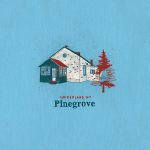
Atwood Magazine: With Amperland, NY, why did you decide to weave in a story and not just do a straight-up concert movie?
Evan Stephens Hall: The short answer is for fun, just because we wanted to. I had no sense of whether it would work, and maybe I’m not even qualified to say whether it works for a general audience, but I like the way it came out. It started with the idea that we wanted to record a bunch of our songs from across the catalogue. We loved making Skylight in that room, we loved making Marigold in that room; I think there’s something special to it. And with Skylight, we weren’t really sure how to lasso the sound. It was a bit evasive because it’s a very reverberant room. With Marigold, we realized there’s a bit of a learning curve, and I’d actually say that Amperland is the best-sounding record that we’ve made in that room. Basically, we just wanted another try, and I wasn’t quite ready to put down to tape whatever new songs I was working on. Historically, we’ve loved revisiting old songs and restructuring them, so that’s where we started. Another piece of it is that we’ve always loved doing those in-studio sessions. A lot of people have told me that the Audiotree session is how they discovered Pinegrove. And for some people, some of those recordings are the definitive editions of those songs, the definitive iterations. I’m not really sure that I believe that any of these songs are “definitive” in that sense; I like to think of them as breathing organisms that have a mind and aesthetic and journey of their own. The point is, we we knew we wanted to start with audio, and then I just started thinking about how we could push it further. We knew that we could do the session thing because we’ve done a lot of those, so how can we do something that we don’t know for sure that we can do and that would that be an exciting challenge for us?
I’m not really sure that I believe that any of these songs are “definitive” in that sense; I like to think of them as breathing organisms that have a mind and aesthetic and journey of their own.
You bring up the idea of songs as organisms, and I think that's especially true for Pinegrove. You mentioned Audiotree, and you’re right to say that many fans do consider those live recordings to be the ultimate versions of those songs. I've been to several Pinegrove shows and I’ve noticed that the crowd sings along to harmonies and vocal melodies that don't exist in the studio versions. Do you make a conscious effort to make the live versions different than the studio versions?
Evan Stephens Hall: Yes, absolutely, there is a conscious effort to do that. And that starts with wanting to entertain ourselves. There’s also the feature of having a bunch of friends who are committed to the project in varying degrees, so we frequently have a different membership on stage. And very early on, we decided that it was a fool’s errand to try to recreate anything that happened before. Music is something that happens in time, and therefore, it’s a unique opportunity each time. It’s sort of boring to recreate it. So, in every case, we try to play to the room, we try to play to the strengths of the people who are on stage playing in that iteration, and, consequently, a different version will come out.
Speaking of playing to the strengths of each room, Amperland is so beautifully mixed. Having Sam Skinner on board for those sessions was probably such an advantage.
Evan Stephens Hall: Absolutely, and I wouldn’t want to make a record with anybody else at this point. We’ve all been playing music together for a long time, so we really flow and understand each other. And so with the example of Sam, we just really get how each other works and what we’re going for and how to push each other and when we’re pushing too too hard. Making music is a very emotional thing because people are invested with the ideas that they’re suggesting, and on a good day, the music itself is emotional just on its own. So, for me, it’s made all the difference that I’m making music with people that I know really well. And my partnership with Sam is a really extraordinary example of how you can grow with someone and zero in on a shared aesthetic.
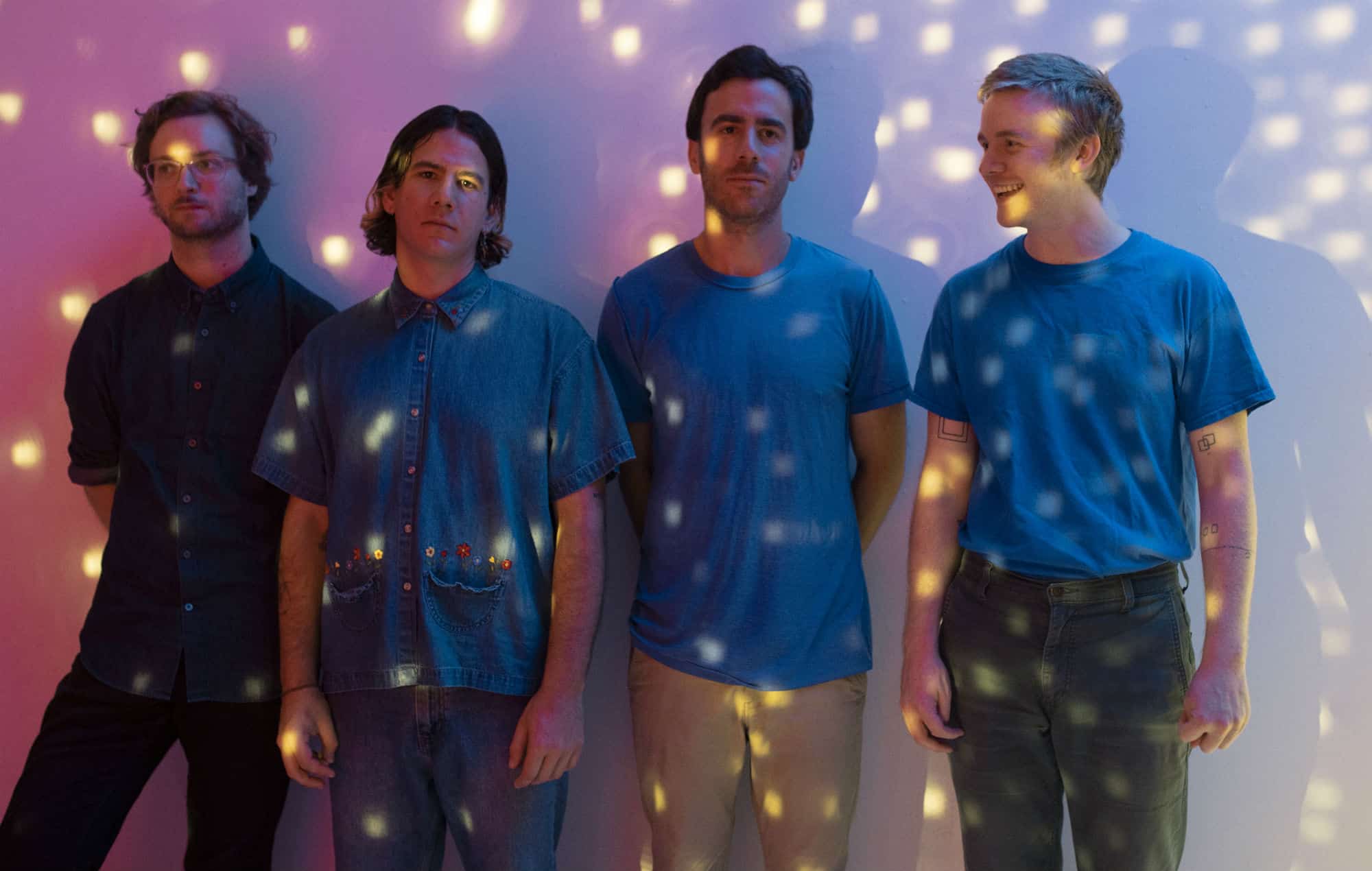
How did you guys go about writing and producing the ambient, transitional music in between the songs?
Evan Stephens Hall: I actually started recording some of the guitar parts before I even knew what it would be for. Then Sam recorded separately once we knew that we were going to be doing this project, even though we didn’t really know what form it would take. He was just sort of messing around with modular synths. I think he got a free trial for a program, so he just used those 30 days to make a bunch of different synth loops. When it came time to put it to picture, we just drew from those two sources. I also took a lot of advice from my dad who, for a long time, had a career as a composer for TV commercials, and he’s scored some films as well. So he was invaluable in showing me logistically how to put sound to image.
Your dad, and also Zach and Nick Levine’s dad, are both featured in the movie playing with the band. I know they have experience playing music together as well. Do you ever ask your dad for advice regarding Pinegrove songs? Do you ever run ideas by him or write with him?
Evan Stephens Hall: We definitely talk about songwriting. I think the funny thing is that, at this point, since I’ve really focused on writing pop songs, essentially (or indie rock songs, folk songs, whatever you want to call it), I’ve done more of that in my life than my dad has. But he’s done more way more work as an instrumentalist, and he’s familiar with music theory in a way that I’m not, so we each have our strengths. As far as pop songwriting, sometimes he’ll ask me questions about it. It’s one of those funny things when you get to be a certain age, where there are certain elements of your relationship with your parents that are more like a peer relationship. But most broadly, I learned an immeasurable amount from him just growing up and being exposed to music and to playing instruments casually. And music is in my family — my grandmother played piano, my grandfather sang, my dad’s sisters play music, and my mom is an avid music listener. She introduced me to really formative sounds like Gillian Welch and Lucinda Williams, which turned out to be hugely influential for the type of sound that I try to go for.
There are some obvious fan-favorite songs — some of your most popular songs — that are missing from the film and its soundtrack: “Aphasia,” “Old Friends,” “New Friends” and “Rings,” just to name a few. I know you mentioned that you wanted to shine light on certain songs that hadn’t been recorded in a live setting before, but how did you go about choosing which songs to include and where to put them in the film?
Evan Stephens Hall: There are already versions on the internet of certain songs we included that I still stand behind; I really liked the way they came out. And not all of the songs did have versions, like “Sunday.” We play just about every song on the new album from Marigold, plus lots of Skylight ones. We wanted to do a mix. We started with more songs than we ended up with, meaning we recorded some songs that didn’t ultimately make the cut, and I think those decisions were reached pretty organically. There wasn’t a lot of planning other than trying to avoid being redundant.
At the end of the film, we find out that Lincoln the sloth is enjoying himself in Costa Rica. Does that mean we will not be seeing him anymore on tour?
Evan Stephens Hall: Well, I’d like to remind any readers of the magazine that we were all acting in the movie. It’s fiction. So, Lincoln might pop up now and then, but it is true that he is sort of considering other ambitions and how to cultivate those aspects of his life. There’s absolutely no animosity between us.
Okay, that's good to hear. On another note, the Pinegrove aesthetic is so heavily rooted in primary colors, which is definitely evident in the movie — the set design and the wardrobes. Fans have come up with theories about how colors relate to the sound and theme of each album, whether it’s yellow with Marigold or blue with Skylight. Is there a deeper meaning or intention behind the color schemes, or are they purely for aesthetics?
Evan Stephens Hall: There’s something loosely synesthetic about how I see the connections. It’s essentially a non verbal thing, which is maybe to say it is a primarily aesthetic thing. But that’s not to say that it’s not a complicated relationship. Once I understood that there was a tendency toward certain aesthetic themes, I wanted to pronounce that. I think it’s Dolly Parton who said, “Figure out who you are, and then do it on purpose.” I love that so much. To do something intentionally and to do it with confidence and to play to your strengths is a good thing for an artist. I see Cardinal, Skylight and Marigold as a sequence — I’m building off of the prior release. Each album is an effort to try to, in certain ways, broaden and, in certain ways, refine what the whole project is, starting with those very first songs that are collected on Everything So Far. So it’s kind of conceptual, but then there’s also an element of cart before the horse where the thing that it is — regardless of how it got there — will dictate the thing that comes next, for its own internal reasons that have nothing to do with the logic.
So whether or not it is intentional, there is an inherent association with the album and the album art. I almost feel a seasonal association with your albums, like Skylight, which came out in the fall, is such a warm, autumn album to me. And Marigold, which came out in the winter, I associate with snow. Do you put any thought into when you release an album?
Evan Stephens Hall: Usually the album just gets released as soon as it can, so that’s the short answer. But as far as seasonal imagery, I think that type of thing is really grounding, so I like to include details like that. Also, you take your inspiration where you can get it, and I like to spend time outside, so I’m writing a lot about what’s going on outdoors.
I think those associations are heightened due to lyrical imagery. On Skylight, there's a song called “Thanksgiving,” and on Marigold there's a reference to the polar vortex. Whether or not it’s intentional, it certainly makes an impact.
Evan Stephens Hall: I’m just looking for opportunities, wherever they arise. I think that’s part of what the artist does at a certain level — stepping back and seeing what the song is saying and trying to get out of the way. And then in other ways, you have to work harder to try to make it connect to the whole. But the fact of its connection is more important to me than any particular connection, or how it connects. I think that if you can persuasively suggest these connections, then the listener is going to trust the narrative voice more and will be willing to be more emotionally invested in the art. If you believe that there’s something there, you’re going to find it. There’s something very abstract and nonverbal about that. I’m playing off of the understanding that everybody has associations with colors, and so I’m combining them in ways that hopefully provoke some sort of response. And I’m under no illusions that that’s going to be the same response for everybody — and that’s exciting. The listener will take what they want from these lyrics that are specific in some ways, but very open in other ways.
I think that’s part of what the artist does at a certain level — stepping back and seeing what the song is saying and trying to get out of the way.
So much of Marigold, which came out in January of 2020, now feels so prescient to life in the pandemic, especially “Endless.” I'm sure you've thought about that, but when you listen back to those songs or when you recorded them for Amperland, did they carry a different meaning?
Evan Stephens Hall: Well, Amperland was recorded pre-pandemic. We recorded it in November of 2019, before Marigold came out. The pandemic is certainly a reason why it took so long to finish. That’s another serendipitous thing — we were already working on a concert that would be enjoyed on your computer before it was cool, right? As far as the stormy portent of Marigold, I was writing from a place of wanting to inspect patience and my own internal temporal mechanisms. I was writing from a space of personal isolation and from a period of my life that required a lot of patience. And it was important to me to write honestly about what that was like but without being too didactic. I didn’t want to be too specific about the images I was using, because it was important to me that I wasn’t writing a song about my own pain and sorrow. I wanted to write about those things in general, because one thing that I’ve understood is that suffering is not at all unique — I’m not special.
So, I was trying to write songs about suffering, but not my suffering, because that just wasn’t the message that I wanted to share in that moment. I was going through a process of personal accountability, and so I was explicitly writing about patience. The year that I wrote that album was pretty similar to my year in 2020, except that everybody was isolated in 2020. It’s circumstantially, in some ways, extremely different, but in some, manifestly pretty similar.
Do you think being out of the public eye and able to take your time to get out what you wanted to say was beneficial to the end product?
Evan Stephens Hall: Oh, absolutely, but I don’t think that’s unique for that project. I knew that there would be extra scrutiny on those lyrics and the sounds that we made. I was always pretty particular, so I was just particular in a new way. And I think, in some ways, that resulted in a slightly more careful album, but I was also trying some stuff that I’d never tried before, too.
Before that album came out, you published the chords and the lyrics its songs so that fans could play a part in the album release, guessing how the songs sounded. Were there any fan renditions of Marigold songs that made you think, “We should incorporate that part into the live show,” or like, “Damn, we should have done it like that”?
Evan Stephens Hall: There were absolutely ones that I heard and was like, “Wow, that is so cool and probably better than what I ended up doing.” And there were some that were very similar to what to what it ended up being — to the song that I wrote. And that was fascinating to me, because they had hardly any information except having likely heard other songs that I’ve written, and maybe they were trying to step into my shoes and mimic my writing voice. That was really cool to me. That whole project was really fantastic and a really interesting way to co-write. I definitely want to do this for for the next album that we do, and maybe I’ll collect them and there could be an album of those versions.
If you believe that there’s something there, you’re going to find it.
I'm sure people would love to hear those. I get the sense that you're very in tune with Pinegrove’s fanbase — that you’re keenly aware of the lore that surrounds Pinegrove, including the meme pages and what fans respond to. How do you keep up to date with the fan culture?
Evan Stephens Hall: [laughs] Well it’s metastasizing at its own case; I’m not that much a part of it, but people text me things every now and then. One of the remarkable things about our listenership (or maybe it’s not that remarkable) is that I seem to have attracted people with similar aesthetic perspectives, but also similar humor and a similar worldview, which is so cool. I wrote a lot of these songs as a kind of a message in a bottle for other people out there that felt similarly — people who felt tenderly about the world but had also experienced its disappointments. So, I put a certain energy out into the world, and I’m really just so delighted at the sort of people that listen to our music, and I love the meme culture of it and that people have genuinely met other people and made friends with Pinegrove as a jumping-off point. What better thing? It’s so great.
Speaking of fan culture, Pinegrove tattoos, especially of the cardinal squares and the ampersand, are pretty common among fans. Even Kristen Stewart has one! How intentional was incorporating those symbols into the band's brand, and what is the meaning behind those symbols?
Evan Stephens Hall: I came out of college with my wheels really spinning about semiotics and constructing meaning, how somebody could do that in a really intentional and playful way. In my head, I kind of had a manifesto — I wish I’d written it down — about what the ampersands symbolize and what the squares symbolize, making sure that on every level those things are interacting and amplifying each other. In brief, the ampersand to me is a symbol of multiplicity. It’s about inclusion and different possibilities. It represents a way to read or interpret art, which is to say that anything that occurs to you is there — that’s it’s all true and not to the exclusion of other things. And then extending that to an understanding and appreciation of the complexity of what it is to be alive. We hold opposite truths in our heads all the time. We know that that’s just one of the natural things about being a human, I think. I was encouraged toward that perspective by an English teacher I had who told us when reading Ulysses, “It’s never either or, it’s always and.” I wanted to bring that to music. At the time, I didn’t see other lyricists who were ambitious in the kind of youthful, arrogant way that I was when I was graduating college and starting to write some songs I felt really good about. I wanted to try to make a world that was internally resonant and was also accessible — that there could be a bunch of different layers that somebody could prospectively enjoy the music on, but they didn’t have to get everything. They could like the catchy melody and not really understand what I’m going for with the lyrics, or maybe there’s an image in the lyrics that they like, or maybe they just like the color yellow. And there’s something primordially appealing about some of these simple, primary elements that I’m hoping to mix up in static ways.
As far as the squares, they’re a shorthand for talking about art in general. They represent the frame… the line between art and reality. The frame shows you the delineation between what we’re supposed to be considering art and what is outside that reference. So the squares are an ode to art. It is my commitment to a life of asking those big questions. What does it mean to be a human being? What does it mean to have connections with other people? What does it mean to know that I’m going to die?
The overlapping squares [on the cover of Cardinal] are also like an abstracted bird — one way of looking at it is that it’s a cardinal. I also thought of it as a letter being sent off. The foregrounded square is the one that I wrote and then put in a post office box, and then the backgrounded square is the one that’s getting sent off somewhere, which is how I see my music. It’s a letter to some unknown recipient, sent with love, compassion and hope. And then it’s out of my hands at that point.
It represents a populist or democratic vision I have about art, or at least the art that I’m trying to make, which is songs that friends can sing with each other, that people can learn to play because these chords aren’t hard. So it’s also a wink at the folk tradition.
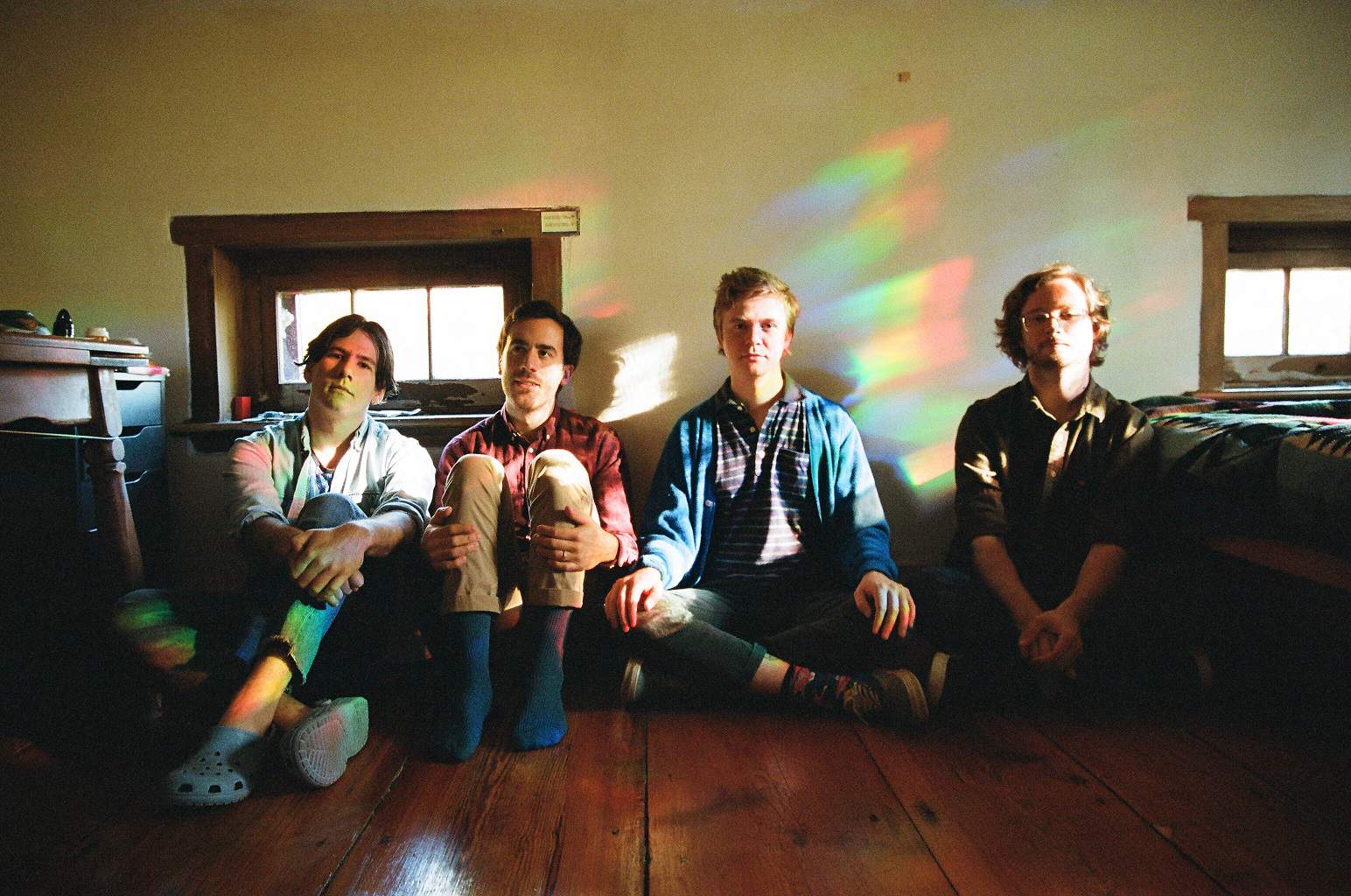
That tradition is evident by your uploading of the guitar tabs to a lot of your songs on the band’s website. There is definitely a community aspect to Pinegrove.
Evan Stephens Hall: Right, and so to bounce off your earlier question, I hope to be intentionally cultivating a community. That’s part of why it’s so amazing to see people geeking out with each other about the Pinegrove iconography or mythology or whatever, because that’s what I like to do as a listener. Radiohead taught me how to do that, Bon Iver in certain ways… The Beatles, Gillian Welch, who writes with enormously ambitious images and themes. I also want to say that, in light of the recent passing of Daniel Dumile, MF Doom was another artist that taught me that music could be really invested in worldbuilding. After studying literature, I was more and more interested in finding music that did that sort of thing. I even became not interested in music that didn’t do that sort of thing. And maybe that’s kind of at odds with this democratic vision of what art should be, but then again, we contain multitudes. [laughs]
It's an interesting issue, because when I think of worldbuilding and providing your audience with a depth to the music, I think of Grateful Dead. And they have a similar inclusive, democratic style. But at the same time, I think that they have sort of an inaccessibility because of the level of depth. It's interesting balancing that, I'm sure. As more fans become deeply obsessed with the world that is Pinegrove, maybe it makes it harder for people to become a part of that process.
Evan Stephens Hall: That is something I actually just had a conversation about today. You want to encourage the sleuthing, but you don’t want to make it exclusive. You’re right to bring up the Grateful Dead, by the way, because they were inspirational to me as far as being one of those bands that people care about bootlegs… you know, a particular set in 1973. There’s a general authorization of all the unauthorized marginalia. There’s thousands of hours of music, and if you want to dig through that, you’re welcome to.
They were smart about allowing people to make bootleg tapes of their music and allowing the fans to make their own merchandise and then licensing those fans. It did create a very unique fan base. Do you have a similar vision for Pinegrove’s music in terms of the live tapes, given that you've released two live albums, an Audiotree session and now Amperland?
Evan Stephens Hall: Well, yes. I will say that when we recorded Audiotree, I didn’t understand that it was gonna go on our Spotify. I didn’t think people were going to consider that an official release. I just saw it as another in-studio session, which I was excited to do. And it came at the very end of a seven-week tour. I was exhausted on that particular morning and was sort of upset about something personal, and I tried to bring it, but at the end of the set, I was just like, “Alright, we’re going to Thalia Hall or wherever we played that night in Chicago.” I really had no idea that it would be a thing at all, and I’m happy that it is.
That’s so interesting to hear that you didn't walk out of that session thinking, “Damn, we killed it! That version of ‘Aphasia’ is going to take off.”
Evan Stephens Hall: No, and I think back then — even more militantly than I believe now — I was all about the concept that each single iteration is just one moment in time. It’s like stepping into a river — you never step in the same river twice. Each time, I’m trying to bring out something new. But the more I played the songs, the harder it was to remember them, because my mind would wander. I found myself forgetting lyrics if I wasn’t trying to change the song up in some way that was actively engaging to myself.
I've spoken with other artists who say that they get bored on stage sometimes, and they need something to keep them engaged to avoid just running through the motions.
Evan Stephens Hall: Yeah, and I have to report that that’s a pretty depressing feeling when that happens. You’re in front of people who are hopefully enjoying it, and that’s the only time that they’re seeing you that year. Maybe it’s your 60th time playing that song that year, and the disconnect is heartbreaking. It’s a very lonely feeling.
Going back to the fan culture, one of the most beloved relics by the Pinegrove community is the song “Toast.” Will that ever get a proper release, or do you think that would ruin its mystique?
Evan Stephens Hall: [laughs] I know that a proper release of the song “Toast” at some point would make people really happy. And who am I to deny those people that happiness if it’s a pretty simple thing for me to do? I don’t have specific plans in this moment to do it, but I think that would be nice. I’m starting to accumulate songs that don’t quite fit in with what I’m trying to do with Pinegrove — they’re more silly. At some point, I’ll probably make a record with these other songs. I don’t have any particular plans for it, but I would like to.
You also have some new songs that you've teased on Instagram this past summer. Can we expect those to be released?
Evan Stephens Hall: Yeah, we’re working on something. It’s not finished yet, but when you hand [a record] in, then it’s like another five or six months before it can be properly released. Insanely, there are not that many vinyl production plants. So like probably half the records you own are from this one plant in the Czech Republic. But I expect to put out a record of all new songs this year, at some point.
That’s great to hear. The last person I interviewed for Atwood was Kevin from Field Medic, and we talked about you covering his song “POWERFUL LOVE” on your live stream. Do you ever see Pinegrove collaborating with other artists?
Evan Stephens Hall: Well, I think my ideal collaboration ideas is the Pinetabs thing. I have another idea that I’ll probably want to actualize which is putting out scraps of stuff that I haven’t really been able to formulate into songs but that I really enjoy. Maybe people could take that and write in a nonexclusive context, like a bunch of different people interpret this scrap if they want to. That could be another way of collaborating. On Marigold, I have a co-write with Josh [Marre] on “Alcove.” He wrote the outro melody. And I co-wrote a new one with Sam. But the thing is that my best ideas tend to happen when I’m by myself. Not to say that I’m against collaboration — I’m certainly not — but it’s just not what I’m up to these days.
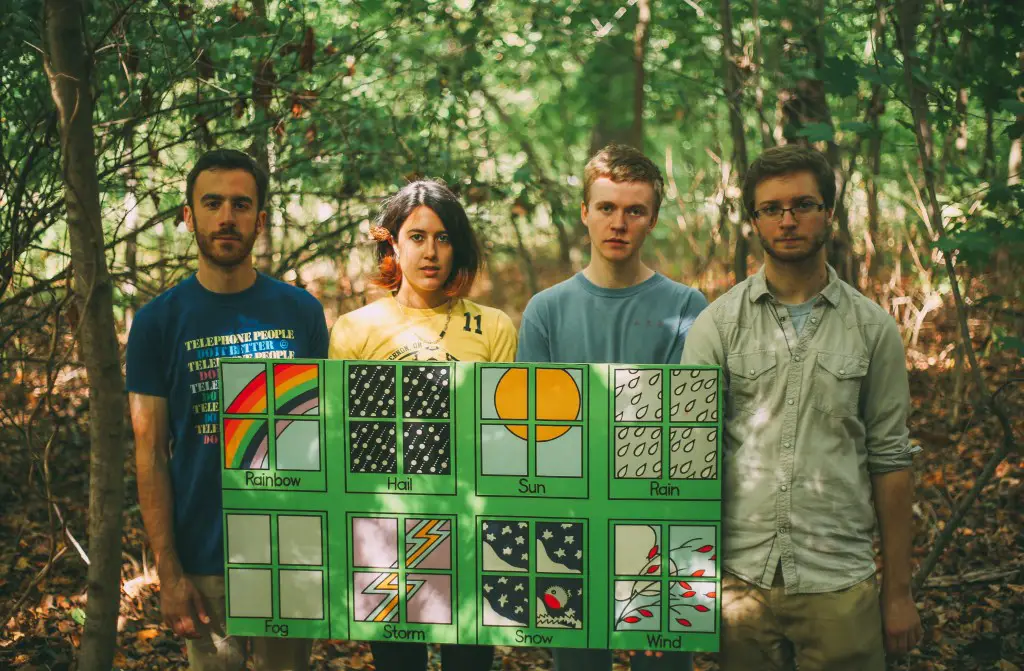
Last week, Zach posted footage of Pinegrove playing Jackson 5’s “I Want You Back” at he and Nandi’s wedding. What was it like turning into a wedding band? Did you guys play other songs?
Evan Stephens Hall: [laughs] Yeah, we did. We we played a handful. That was super fun. Especially early on when Pinegrove really had no listenership, we talked a lot about like, “Damn, should we be thinking about other ways to make money here? What if we learned like a hundred classic pop and soul songs and then did the wedding circuit?” But that never really materialized, so we finally got to moonlight as a wedding band, which is something that we’d always wanted.
Well that concludes our interview. Is there anything else you’d like to add?
Evan Stephens Hall: One earlier idea I had that I didn’t bring up quickly enough was how surprised I was at the tonal shift in the movie. Once I put music to picture, it made the movie as weird as I hoped it could be, whereas before, it was not quite working for me. That was just extremely interesting to me from a first-time composer standpoint, that there was an enormous tonal shift when we added the music.
Yeah, it had a weird, almost melancholy feeling to it.
Evan Stephens Hall: [laughs] Yeah! Without the music, I was like, “Okay, this may be a little corny.” And by the way, I take full responsibility for that — I wrote it. But when the music hit, I was like, “Oh, this does have something. This is registering emotionally with me in ways that I couldn’t have predicted.” So that’s one point that I wanted to share.
And then I’d be remiss if I didn’t mention Kenna Hynes who directed the movie. It was really good working with her. She totally knows what she’s doing. It was great to have somebody who could steer the ship a little bit. To that end, it was really a lesson for me about overextending myself. I did write it, I did the art the direction, and I was the musical director for the arrangements, essentially. That was quite collaborative, but somebody had to wrangle, and that was me. And yet, there were people involved in making every single part of Amperland happen, and frequently, they were people who had more experience in that role than I had. So it was an exercise in humility, and I appreciated that. With all of that in mind, it was really quite amazing to work with Kenna and see her fluency. It was a reminder that for as many hours as I’ve tried to teach myself how to write songs, somebody else is doing that in in filmmaking or in prose writing or in painting. And it’s fun to moonlight in any of those disciplines, but it brought me a real appreciation for the other artists in my community. I’m really proud of the work that we all made together.
— —
:: stream/purchase Amperland, NY here ::
— — — —

Connect to Pinegrove on
Facebook, Twitter, Instagram
Discover new music on Atwood Magazine
? © Kenna Hynes
Pinegrove

